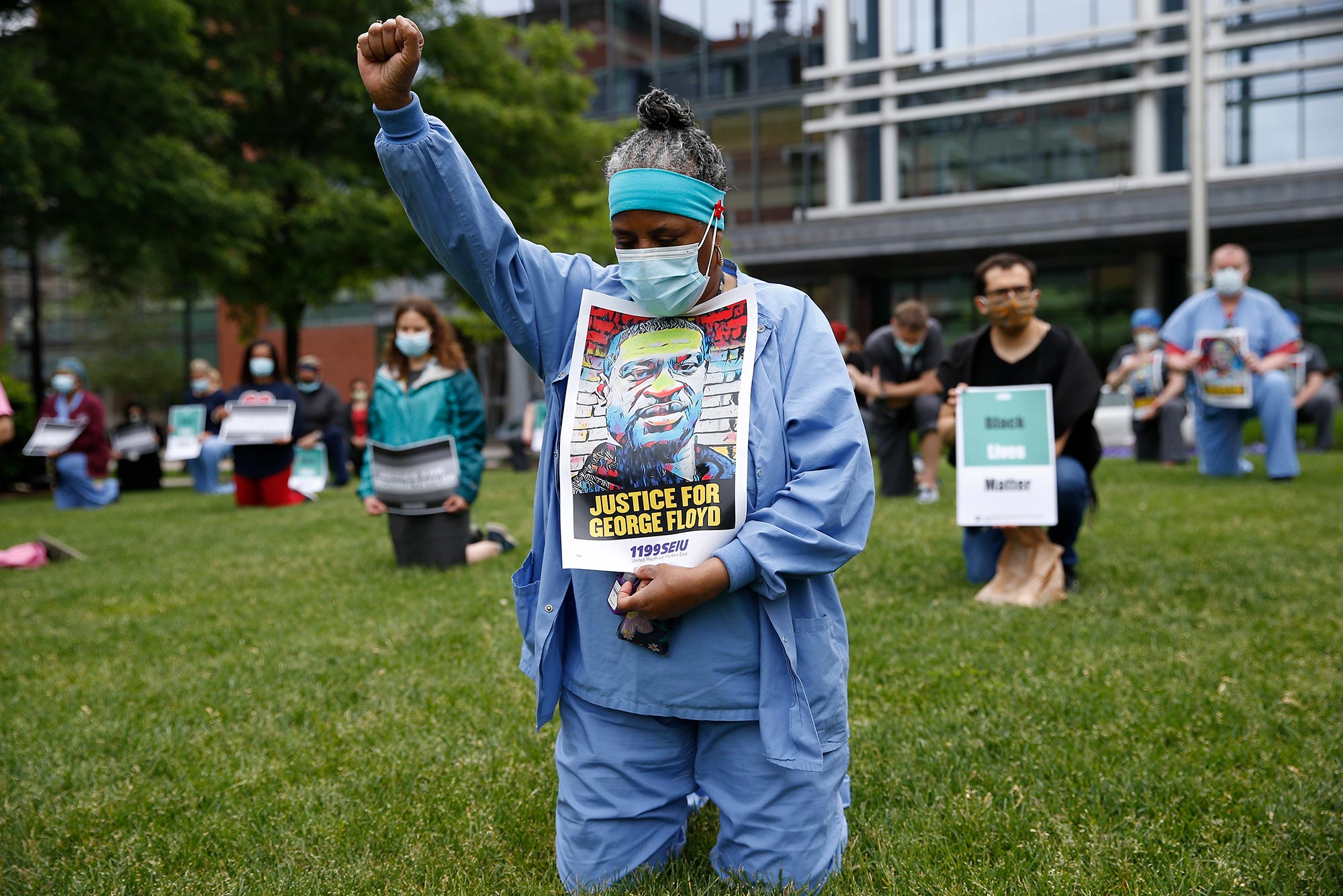BU to Host a Day of Collective Engagement to Reflect on Racism June 24

Keila Price, a Boston Medical Center administrative assistant, joined BMC coworkers June 11 for an 8-minute, 46-second period of silence for George Floyd and other people of color killed by police. Photo by Jessica Rinaldi/Boston Globe via Getty Images
Updated: BU Will Host Day of Collective Engagement June 24 to Reflect on American Racism
Classes and events rescheduled; website with agenda details forums happening all day
Update: The website with the agenda and Zoom access for the Day of Collective Engagement is now live.
- BU schedules Day of Collective Engagement June 24 to ponder systemic US racism
- Classes, University events canceled that day to permit attendance
- A website has been created for the BU community to follow the events
For perhaps the first time since the tumult of the Vietnam War, when finals and Commencement were canceled in 1970, the University will suspend all business—classes, meetings, and events—on June 24 so that the BU community can explore the trauma of racism in America.
The University has asked all faculty and managers to reschedule anything planned for that day to allow for a daylong community discussion about American racism and antiracism.
The BU-wide Day of Collective Engagement: Racism and Antiracism, Our Realities and Our Roles will be held remotely in response to weeks of national protests sparked by police killings of Black people across the country. The day will begin at 8:30 am with an opening plenary session, A Conversation on the History of Racism. That will be followed by concurrent discussion sessions, lunch discussions, a town hall led by Robert A. Brown, BU president, and Jean Morrison, University provost, and closing debriefings open to all BU affiliates and led by faculty and staff, ending at 4:30 pm.
“We are currently experiencing one of the most significant human rights moments of our lifetimes, as people in all 50 states and around the world have mobilized in horror in response to the killing of yet another unarmed Black person by the police,” Brown, Morrison, and Crystal Williams, associate provost for diversity and inclusion, wrote in a letter sent to the University community June 16.
“This movement was sparked most recently by the heinous murders of Ahmaud Arbery, Breonna Taylor, and George Floyd, but is also in response to the deaths of countless Black people as a result of centuries of racism and racist policies and structures. The racial disparities which undergird so much of contemporary American society have also been laid bare in the disproportionate toll the COVID-19 pandemic has had on American communities of color.”
The discussion sessions will include topics that for many people may be unfamiliar and even uncomfortable, applying on campus and off.
A conversation about white allyship, advocacy, and leadership will be led by Carrie Preston, a College of Arts & Sciences professor of English and director of Kilachand Honors College. Angela Onwuachi-Willig, dean of the School of Law, will lead An Examination of How the Law Perpetuates Violence against People of Color. Among other topics: Racism and Antiracism in the Clinical Medical Practice; Inclusive Pedagogy and Decolonizing the Curriculum; and Practices and Ways to Undertake Antiracist Work Outside of the Academy. Ibram X. Kendi, the inaugural leader of BU’s new Center for Antiracist Research, will lead the plenary discussion.
We are currently experiencing one of the most significant human rights moments of our lifetimes.
“The entire country is on tenterhooks,” says Williams. “People are in pain and are suffering—have been suffering. But the answers won’t come quickly, and the remedies even less so. The systems in which we find ourselves entrenched are sophisticated and complex, and too often, so normalized that to see them anew requires a great deal of effort and a willingness to question everything.
“This collective day of engagement,” she adds, “is an important first step towards creating a world that is more equitable, is antiracist, and is a world in which we can all thrive. It’s a day to challenge ourselves, and it is a hopeful day that speaks to our highest aspirations as individuals.”
“As a community of individuals committed to the attainment of knowledge and pursuit of the truth,” Brown, Morrison, and Williams wrote, “we believe it is the responsibility of the entire University community to listen, learn, think critically about, and collectively reflect upon, these issues deliberately and with the seriousness they deserve.” The letter asked that faculty and managers “ensure that all classes, meetings, and events currently scheduled for June 24 be rescheduled on another day so that all members of our community can fully participate in these dialogues.”
Among the questions the sessions will probe, according to Brown, Morrison, and Williams: “What is racism? What are the policies that animate, perpetuate, and protect it? How did we get here? How do we change the policies and practices that perpetuate racism?
“These questions are essential at this moment in our history. And, exploring them is a necessary first step if we are ever to successfully address systemic racism.”
“Our nation is facing a terribly challenging time,” Morrison told BU Today, “and the moment requires that we speak honestly and directly with one another as colleagues, classmates, friends, and family members. This University-wide conversation, which we are eager to engage in, is a critical step. Through this day, we hope to provide an opportunity for needed introspection and a forum for coming together and striving for positive, meaningful societal change.”

Comments & Discussion
Boston University moderates comments to facilitate an informed, substantive, civil conversation. Abusive, profane, self-promotional, misleading, incoherent or off-topic comments will be rejected. Moderators are staffed during regular business hours (EST) and can only accept comments written in English. Statistics or facts must include a citation or a link to the citation.